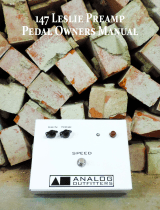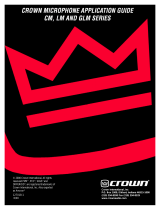
5
Operating Mode 쐃:
• Permanently switched on (ON):
disables the switch completely, the microphone is perma-
nently switched on. The red LED on the top lights up.
• Push-to-talk (PTT):
The microphone is switched on as long as the membrane
switch is pressed; the red LED on the top lights up.
• Push-to-mute (PTM):
The microphone is switched off as long as the membrane
switch is pressed; the red LED on the top is off.
• On/off (ON/OFF, factory preset):
The microphone is switched on when the membrane switch is
pressed; the red LED on the top lights up. When the mem-
brane switch is pressed again, the microphone is switched
off; the red LED on the top is off.
Frequency response curve 쐇:
• Low cut:
reduces the bass frequencies to minimize structure-born
noise – this switch (1) is independent of the other three DIP
switches and can be used in any of the following conditions
(eg: you can use the low cut as well as the bass boost if
placing the microphone on a small table with a high risk of
structure-born noise).
• Low boost:
extends the bass response to compensate for putting the
microphone on a small table.
• Low and high boost (factory preset):
extends the frequency response at both ends.
• Linear:
is the natural response of the microphone.













